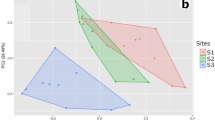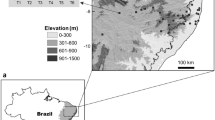Abstract
Predation strategies are often habitat-dependent; therefore, contrasting biomes, such as rainforests and seasonally dry forests, may be useful for understanding how the environment influences predatory behavior. The aim of this study was to evaluate the prey capture behavior of scorpions from contrasting habitats in northeastern Brazil. The scorpions’ use of the stinger and movement probability after prey capture were analyzed. We collected 120 scorpions, 60 from the Atlantic Forest and 60 from the Caatinga drylands. Our results indicate that scorpions from the Atlantic Forest tended to use their stinger more frequently than those from the Caatinga habitat. We also found that Caatinga scorpions moved approximately 40% more after prey capture than the Atlantic Forest species. Environmental pressures related to the metabolic costs of venom production and potential predation risk may partially explain the differential behavior observed in this study. Therefore, our results suggest that despite the morphological differences between species, animals from contrasting habitats may show different prey capture strategies.

Similar content being viewed by others
Data availability
All data are available in supplementary material.
References
Albín A, Toscano-Gadea CA (2015) Predation among armored arachnids: Bothriurus bonariensis (Scorpions, Bothriuridae) versus four species of harvestmen (Harvestmen, Gonyleptidae). Behav Proc 121:1–7. https://doi.org/10.1016/j.beproc.2015.10.003
Altmann J (1974) Observational study of behavior: sampling methods. Behaviour 49:227–266. https://doi.org/10.1163/156853974x00534
Amorim IL, Sampaioll EVSB, Araújo EL (2005) Flora and structure of the tree and shrub vegetation of the Caatinga at Seridó, Rio Grande do Norte State, Brazil. Acta Bot Bras 19:615–623. https://doi.org/10.1590/S0102-33062005000300023
Araújo CS, Candido DM, Araújo HFP, Dias SC, Vasconcellos A (2010) Seasonal variations in scorpion activities (Arachnida: Scorpiones) in an area of Caatinga vegetation in northeastern Brazil. Zoologia 27.
Auer SK, Martin TE (2013) Climate change has indirect effects on resource use and overlap among coexisting bird species with negative consequences for their reproductive success. Glob Change Biol 19:411–419. https://doi.org/10.1111/gcb.12062
Barlow A, Pook CE, Harrison RA, Wuster W (2009) Coevolution of diet and prey-specific venom activity supports the role of selection in snake venom evolution. Proc R Soc B: Biol Sci 276:2443–2449. https://doi.org/10.1098/rspb.2009.0048
Bates D, Mächler M, Bolker B, Walker S (2015) Fitting linear mixed-effects models using lme4. J Stat Soft 67. https://doi.org/10.18637/jss.v067.i01
Boström-Einarsson L, Bonin MC, Munday PL, Jones JP (2014) Habitat degradation modifies the strength of interspecific competition in coral dwelling damselfishes. Ecology 95:3056–3067. https://doi.org/10.1890/13-1345.1
Brown CA, O’Connel DJ (2000) Plant climbing behavior in the scorpion Centruroides vittatus. Am mid Nat 144:406–418. https://doi.org/10.1674/0003-0031(2000)144[0406:PCBITS]2.0.CO;2
Brown JL, Hill DJ, Dolan AM, Carnaval AC, Haywood AM (2018) PaleoClim, high spatial resolution paleoclimate surfaces for global land areas. Sci Data 5:1–9. https://doi.org/10.1038/sdata.2018.254
Casper GS (1985) Prey capture and stinging behavior in the emperor scorpion Pandinus imperator (Koch) (Scorpiones, Scorpionidae). J Arachnol 13:277–283
Díaz C, Rivera J, Lomonte B, Bonilla F, Diego-García E, Camacho E, Tytgat J, Sasa M (2019) Venom characterization of the bark scorpion Centruroides edwardsii (Gervais 1843): composition, biochemical activities and in vivo toxicity for potential prey. Toxicon 5:7–19. https://doi.org/10.1016/j.toxicon.2019.09.021
Diehl S (1992) Fish predation and benthic community structure: the role of omnivory and habitat complexity. Ecology 73:1646–1661. https://doi.org/10.2307/194017
Dionisio-da-Silva W, Lira AFA, Albuquerque CMR (2019) Prey-predator interactions between two intraguild predators modulate their behavioral decisions. Acta Ethol 22:195–201. https://doi.org/10.1007/s10211-019-00326-6
Edmunds MC, Sibly RM (2010) Optimal sting use in the feeding behavior of the scorpion Hadrurus spadix. J Arachnol 38:123–125. https://doi.org/10.1636/Hi09-38.1
Evans ERJ, Northfield TD, Daly NL, Wilson DT (2019) Venom costs and optimization in scorpions. Front Ecol Evol 7:196. https://doi.org/10.3389/fevo.2019.00196
Fernandes MF, Queiroz LP (2018) Vegetação e flora da Caatinga. Ciência e Cultura 70, (4). https://doi.org/10.21800/2317-66602018000400014
Forstmeier W, Weiss I (2004) Adaptive plasticity in nest-site selection in response to changing predation risk. Oikos 104:487–499. https://doi.org/10.1111/j.0030-1299.1999.12698.x
Garreaud RD, Vuille M, Compagnucci R, Marengo J (2009) Present-day South American climate. Palaeogeogr Palaeoclimatol Palaeoecol 281:180–195. https://doi.org/10.1016/j.palaeo.2007.10.032
Gomes JM, Pereira MG, Piña-Rodriguez FCM, Pereira GHA, Gondim FR, Silva EMR (2010) Aporte de serapilheira e de nutrientes em fragmentos florestais da Mata Atlântica. Rev Bras Ciênc Agr 5:383–391. https://doi.org/10.5039/agraria.v5i3a552
Hartig F (2021) DHARMa: residual diagnostics for hierarchical (multi-level/ mixed) regression models. R package version 0.4.3. https://CRAN.R-project.org/package=DHARMa. Accessed on 10/01/2022.
Hill JE, DeVault TL, Belant JL (2019) Cause-specific mortality of the world’s terrestrial vertebrates. Global Ecol Biogeogr 28:680–689. https://doi.org/10.1111/geb.12881
IBF – Instituto Brasileiro de Florestas (2021) Bioma Mata Atlântica. https://www.ibflorestas.org.br/bioma-mata-atlantica (Acessed in 25 June 2021)
Jiao G, Zhu M (2009) Courtship and mating in Heterometrus petersii (Thorell, 1876) (Scorpiones: Scorpionidae). Euscorpius 84:1–5. https://doi.org/10.18590/euscorpius.2009.vol2009.iss84.1
Li D, Lee WS (2004) Predator-induced plasticity in web-building behavior. An Behav 67:309–318. https://doi.org/10.1016/j.anbehav.2003.06.011
Lira AFA, Badillo-Montaño R, Lira-Noriega A, Albuquerque CMR (2020) Potential distribution patterns of scorpions in north-eastern Brazil under scenarios of future climate change. Aus Ecol 45:215–228. https://doi.org/10.1111/aec.12849
Lira AFA, DeSouza AM, Albuquerque CMR (2018) Enviromental variation and seasonal changes as determinants of the spatial distribution of scorpions (Arachnida: Scorpiones) in Neotropical forests. Can J Zool 96:963–972. https://doi.org/10.1139/cjz-2017-0251
Machan L (1968) Spectral sensitivity of scorpion eyes and the possible role of shielding pigment effect. J Exp Biol 49:95–105. https://doi.org/10.1242/jeb.49.1.95
Manzoli-Palma MF, Gobbi N, Palma MS (2003) Insects as biological models to assay spider and scorpion venom toxicity. J Venom Anim Toxins Incl Trop Dis. https://doi.org/10.1590/S1678-91992003000200004
Martin M, Bateson P (1986) Measuring behaviour: and introductory guide. Cambridge University Press
McCauley DJ, Young HS, Dunbar RB, Estes JA, Semmens BX, Michelli F (2012) Assessing the effects of large mobile predators on ecosystem connectivity. Ecol Soc Am 22:1711–1717. https://doi.org/10.1890/11-1653.1
McReynolds CN (2008) Microhabitat preferences for the errant scorpion, Centruroides vittatus (Scorpiones, Buthidae). J Arachnol 36:557–564. https://doi.org/10.1636/T07-07.1
Mendonça AA (2013) Plasticidade comportamental e limiar de extinção em comunidades de aranhas tecedeiras em paisagens fragmentadas da Mata Atlântica da Bahia. Masteral Thesis
Mills NJ, Kean JM (2010) Behavioral studies, molecular approaches, and modeling: methodological contributions to biological control success. Biol Con 52:255–262. https://doi.org/10.1016/j.biocontrol.2009.03.018
Nisani Z, Boskovic DS, Dunbar SG, Kelln W, Hayes WK (2012) Investigating the chemical profile of regenerated scorpion (Parabuthus transvaalicus) venom in relation to metabolic cost and toxicity. Toxicon 60:315–323. https://doi.org/10.1016/j.toxicon.2012.04.343
Nisani Z, Hayes WK (2011) Defensive stinging by Parabuthus transvaalicus scorpions: risk assessment and venom metering. Anim Behav 81:627–633. https://doi.org/10.1016/j.anbehav.2010.12.010
Olivero PA, Mattoni CI, Peretti AV (2017) Differences in mating behavior between two allopatric populations of a Neotropical scorpion. Zoology 123:71–78. https://doi.org/10.1016/j.zool.2017.06.009
Pavan M (1954) Studi sugli Scorpioni, Bollettino di zoologia, 21:283–291. https://doi.org/10.1080/11250005409438184
Pereira AB (2009) Mata Atlântica: uma abordagem geográfica. Dialnet 6:1–27. https://doi.org/10.3738/1982.2278.152
Petren K, Bolger DT, Case TJ (1993) Mechanisms in the competitive success of an invading sexual gecko over an asexual native. Science 259:354–358. https://doi.org/10.1126/science.259.5093.354
Polis GA (1990) The biology of scorpions. Stanford University Press
Polis GA, Farley RD (1979) behavior and ecology of mating in the cannibalistic scorpion, Paruroctonus mesaensis Stahnke (Scorpionida: Vaejovidae). J Arachnol 7:33–46. https://www.jstor.org/stable/3704952
Polis GA, McCormick SJ (1986) Scorpions, spiders and solpugids: predation and competition among distantly related taxa. Oecologia 71:111–116. https://doi.org/10.1007/BF00377328
Quinlan TG, Smith GT, Calver MC (1995) Relationships between morphology and feeding behaviour in the syntopic scorpions Urodacus armatus Pocock and Urodacus novaehollandiae Peters (Scorpiones: Scorpionidae). Aus J Entomol 34:277–279. https://doi.org/10.1111/j.1440-6055.1995.tb01339.x
R Core Team (2021) R: a language and environment for statistical computing. R Foundation for Statistical Computing. https://www.R-project.org/. Accessed 3 Aug 2019.: 372–376. https://doi.org/10.1590/S1984-46702010000300008
Rein JO (1993) Sting use in two species of Parabuthus scorpions (Buthidae). J Arachnol 21:60–63
Rein JA (2003) Prey capture behavior in the East African scorpions Parabuthus leiosoma (Ehrenberg, 1828) and P. pallidus Pocock, 1895 (Scorpiones: Buthidae). Euscorpius 6: 1–8. https://doi.org/10.18590/euscorpius.2003.vol2003.iss6.1
Richards DP, Barlow A, Wuster W (2012) Venom lethality and diet: differential response of natural prey and model organisms to the venom of the saw-scaled vipers (Echis). Toxicon 59:110–116. https://doi.org/10.1016/j.toxicon.2011.10.015
Simone Y, Garcia LF, Lacava M, van der Meijden A, Viera C (2018) Predatory versatility in females of the scorpion Bothriurus bonariensis (Scorpiones: Bothriuridae): overcoming prey with different defensive mechanisms. J Insect Behav 31:402–415. https://doi.org/10.1007/s10905-018-9677-x
Simone Y, van der Meijden A (2021) Armed stem to stinger: a review of the ecological roles of scorpion weapons. J Venom Anim Toxins Incl Trop Dis. https://doi.org/10.1590/1678-9199-JVATITD-2021-0002
Stewart AK (2006) Observations on prey-capture behavior of Androctonus crassicauda (Olivier, 1807) (Scorpiones: Buthidae) in northern Iraq. Euscorpius 37:1–8. https://doi.org/10.18590/euscorpius.2006.vol2006.iss37.1
Swisher BJ, Soluk DA, Wahl DH (1998) Non-additive predation in littoral habitats: influences of habitat complexity. Oikos 81:30–37. https://doi.org/10.2307/3546464
Tworek S (2002) Different bird strategies and their responses to habitat changes in an agricultural landscape. Ecol Res 17:339–359. https://doi.org/10.1046/j.1440-1703.2002.00493.x
van der Meijden A, Coelho P, Rasko M (2015) Variability in venom volume, flow rate and duration in defensive stings of five scorpion species. Toxicon 100:60–66. https://doi.org/10.1016/j.toxicon.2015.04.011
van der Meijden A, Herrel A, Summers A (2010) Comparison of chela size and picer force in scorpions; getting a first grip. J Zool 280:319–325. https://doi.org/10.1111/j.1469-7998.2009.00628.x
van der Meijden A, Kleintech T, Coelho P (2012) Packing a pinch: functional implications of chela shapes in scorpions using finite element analysis. J Anat 220:423–434. https://doi.org/10.1111/j.1469-7580.2012.01485.x
Venzon M, Pallini A, Janssen A (2001) Interactions mediated by predators in arthropod food webs. Neotrop Entomol 30:1–9. https://doi.org/10.1590/S1519-566X2001000100002
Acknowledgements
We are grateful to the two anonymous referees and the editor Matthieu Paquet for their valuable comments for the improvement of our manuscript.
Funding
This study was supported by Fundação de Amparo à Ciência e Tecnologia do Estado de Pernambuco-FACEPE for undergraduate scholarship (BIC-0884–2.04/21) to HPC, and a postdoctoral scholarship (BFP-0121–2.05/20) to AFAL. We also thank the Estonian Research Council for providing financial support for the development of this study (grant PRG741).
Author information
Authors and Affiliations
Contributions
Experimental design was planned by AFAL, ABS, and GJBM. The fieldwork and laboratory experiments were conducted by AFAL, ABS, and HPC. The manuscript was drafted by HPC. Data analyses were provided by SIAF. All authors contributed equally for the revision of the manuscript.
Corresponding author
Ethics declarations
Ethics approval
Experiments using invertebrate animals conducted in Brazil do not require approval by the Ethics Committees, as established by the Brazilian Council for the Control of Animal Experimentation (CONCEA) (Law 11.794/08, § 3).
Conflict of interest
The authors declare no competing interests.
Additional information
Publisher's Note
Springer Nature remains neutral with regard to jurisdictional claims in published maps and institutional affiliations.
Supplementary information
Below is the link to the electronic supplementary material.
Rights and permissions
About this article
Cite this article
Cunha, H.P., Santos, A.B., Foerster, S.Í.A. et al. Can contrasting habitats influence predatory behavior in tropical forest scorpions?. acta ethol 25, 107–113 (2022). https://doi.org/10.1007/s10211-022-00390-5
Received:
Revised:
Accepted:
Published:
Issue Date:
DOI: https://doi.org/10.1007/s10211-022-00390-5




